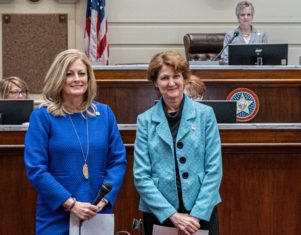Friday, February 28, 2020 marks a pivotal date in the history of this state and the nation. It’s the 100th anniversary of the day Oklahoma became the 33rd state to ratify the 19th Amendment, giving women the right to vote.
The centennial of that historic day was celebrated Thursday in the Senate as members unanimously approved Senate Resolution 13, co-authored by Senate Majority Leader Kim David, R-Porter, Senate Minority Leader Kay Floyd, D-Oklahoma City, and Senate President Pro Tempore Greg Treat, R-Oklahoma City.
 David and Floyd made history in Oklahoma when they became the first women since statehood to hold the posts of Majority and Minority leaders in the First Session of the 57th Legislature. David was also the first woman to serve as Senate Appropriations Chair.
David and Floyd made history in Oklahoma when they became the first women since statehood to hold the posts of Majority and Minority leaders in the First Session of the 57th Legislature. David was also the first woman to serve as Senate Appropriations Chair.
Oklahoma actually approved suffrage two years before passage of the 19th Amendment. In 1917, the State Legislature approved Senate Concurrent Resolution 5, a proposed amendment to Oklahoma’s Constitution giving women the right to vote, which the citizens approved in 1918. However, because a minimum of 36 states were needed in order to enact the 19th Amendment, Oklahoma’s support made that possible, ensuring that the right of citizens of the United States to vote could not be denied or abridged by the United States or by any state on account of sex.
“One hundred years seems like a long time, but then when I stop and remember when my grandmothers were born, women did not have the right to vote, it puts it in a different perspective. Their mothers, their grandmothers could not vote. That happened in their lifetime,” David said. “When you look at it that way, it really hasn’t been that long ago. It’s something none of us should ever forget or take for granted.”
Women’s suffrage organizations began fighting for the vote in the 1890’s, well before Oklahoma’s statehood. Floyd noted women lobbied for suffrage in both the Oklahoma and Indian Territories and at the 1906 constitutional convention in Guthrie. Ultimately, the constitution gave women the right to vote in school elections, but not full suffrage. Nevertheless, women still had an impact on the state’s political landscape.
“Kate Barnard fought hard for children and for social reforms at the convention, and when voters chose office holders for our new state, Kate was elected Commissioner of Charities and Corrections, becoming the first woman in Oklahoma elected to statewide office, and among the first in the nation,” Floyd said. “Despite the many challenges they faced, Oklahoma women persevered, impacting our past, present and our future. This centennial marks an important turning point for our state and our country.”
Since the passage of women’s suffrage, Oklahoma women have gone on to win seats in the legislature, Congress, and statewide offices, including governor and lieutenant governor, and have been appointed as cabinet secretaries and to the office of secretary of state.
“Throughout history, women have proven themselves to be extraordinary leaders whose sacrifice, vision, and determination have shaped the course of this nation for the better,” Treat said. “Women’s suffrage was an important point in the history of our state and nation, and we should always take time to remember and celebrate all of those who worked toward that end.”
“It’s important to remember how hard women fought for suffrage in this country and here in Oklahoma,” David said. “We can best honor that effort by participating in the political process and taking advantage of our constitutional right to vote.”
Editor’s Note: This story was provided by the Oklahoma State Senate Communications Division with minor edits for style.


